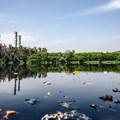University of Cape Town (UCT) PhD candidate Kefiloe Sello's research shows that commodified water further marginalises some people, some become poorer, while some lose their sense of self with water as a commodity, certain rituals, rites of passage or social spaces cease to exist.
For example, when rivers become reservoirs, such rivers may no longer be accessible to communities meaning the communities cannot continue with water related rituals performed in rivers and how the ritual of cleansing cannot be done with tap water. People are forced to travel long distances to find rivers.
Coming from Lesotho, Sello saw first-hand people being relocated to make way for large dam projects: “What stood out for me was how these people’s lives changed because of relocation. Many of them relied on natural resources found in their immediate environment for day-to-day consumption and survival.
“When they moved, many had to adapt to ways of life in the host communities. Of all the changes, having to pay for water while one was used to free-flowing water, seemed the oddest.”
Projects not aligned with SDGs
Many of these projects are not aligned with the Sustainable Development Goals (SDGs), they may adhere to one or two goals but not in totality. While writing her research, Sello used simple language because she hoped that it will reach people outside academia who are responsible for drafting policies and signing checks.
“With this research not only did I speak out on the injustices faced by communities due to being on the wrong side of development, but I also opened the platform for communities to have a voice on how to navigate and negotiate their presence within development projects.
“By pointing out how commodification of water affects communities around project areas, I helped re-think how to better balance socio-ecological relationships. An example is how the research provided ways in which SDGs could be implemented in the next phase of the on-going project in Lesotho,” adds Sello.
Professor Anthony Turton 28 Mar 2022 One of the most interesting points to draw from this is that water commodification in Lesotho not only ended relationships. Communities had water but also birthed new and commercial water which is complex to navigate by water users. One of the most complex things is for people to form identities with commercial water.
Another example is rivers being socialised, riverbanks are communal play areas, learning spaces and the laundromats. With individual taps planted in each compound, water itself is socialised differently and communal spaces cease to exist.
She hopes one day development projects and policies will prioritise communities and the environment before thinking of financial gains.













































